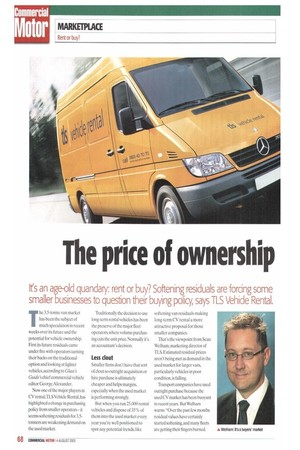The price of ownership
Page 72

Page 73

If you've noticed an error in this article please click here to report it so we can fix it.
Its an age-old quandary: rent or buy? Softening residuals are forcing some smaller businesses to question their buying policy, says TLS Vehicle Rental.
The 3.5-tonne van market has been the subject of much speculation in recent weeks over its future and the potential for vehicle ownership. First its future residuals came under fire with operators turning their backs on the traditional option and looking at fighter vehicles, according to Glass's Guide's chief commercial vehicle editor George Alexander.
Now one of the major players in CV rental,TLS Vehicle Rental, has highlighted a change in purchasing policy from smaller operators-it seems softening residuals for 3.5tonners are weakening demand on the used market. Traditionally the decision to use long-term rental vehicles has been the preserve of the major fleet operators,where volume purchasing cuts the unit price. Normally it's an accountant's decision.
Less clout Smaller firms don't have that sort of clout so outright acquisition or hire purchase is ultimately cheaper and helps margins, especially when the used market is performing strongly.
But when you run 25,000 rental vehicles and dispose of 35% of them into the used market every year you're well positioned to spot any potential trends, like softening van residuals making long-term CV rental a more attractive proposal for those smaller companies.
That's the viewpoint from Sean Welham, marketing director of TLS. Estimated residual prices aren't being met as demand in the used market for larger vans, particularly vehicles in poor condition, is falling.
Transport companies have used outright purchase because the used CV market has been buoyant in recent years. But Welham warns: -Over the past few months residual values have certainly started softening, and many fleets are getting their fingers burned. Only the best vehicles are achieving book price, and buyers can afford to look around and take their pick,he adds.
Welham realises that losing out financially when disposing of vehicles can be "traumatic" for smaller and medium-sized businesses: "They were expecting a lump sum, probably to put towards a new vehicle, and it's suddenly much lower than they were hoping for."
Changing policy
This is where TLS has noted a recent change in vehicle purchasing policy. "in these cases we believe that rental is a viable option and, while it is quite a mental shift for these businesses to make, we are achieving some successes." he adds.
"What rental provides is simple: a fixed-cost van for your business where you only get charged for the time that you need with no unexpected costs.
"When we explain it in these terms, many potential customers are convinced."
Welharn explains that TLS itself uses a "sophisticated disposal strategy" which has effectively shielded it from the effects of softening residual values.
"We dispose of between 8,000 and 9,000 vehicles a year and we use a wide number of methods and channels," he concludes While it would be wrong to say that we have not had to work a little harder to achieve good prices,we are very much holding our own." •




































































































































































































